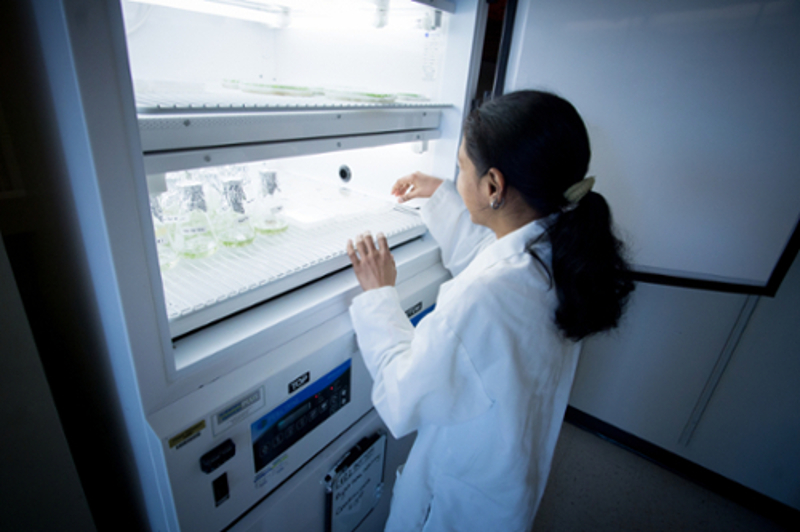Research Experience for Undergraduates (REU) - Genetic and Biochemical Analysis of Proteins
Program Dates: May 26 - July 31, 2026
Program Description
This National Science Foundation sponsored REU program provides advanced research training for undergraduate students in the areas of biochemistry and molecular biology.The program is centered on methods for analysis of proteins with additional emphasis on the combination of molecular genetics and model organisms as a powerful approach to characterizing protein function and regulation. If provides practical experience in application of the scientific method, hypothesis development and testing, as well as a variety of career development and group social activities. A wide range of student research projects mentored by faculty in the Department of Biochemistry is available.
Application Period
Ten-week research-intensive program
Introduction to protein biochemistry and experimental design
Mentored research project
Weekly career development sessions (e.g. ethical conduct in research, professional communication, graduate school application process)
University-wide poster session
Group Social Activities
Participants are provided:
$7000 stipend and additional meal allowance
Housing on campus
Round trip transportation to West Lafayette, Indiana
REU Application
Applications for Summer 2026 are now open. Deadline to apply is February 15, 2026.

- Complete our program's ONLINE APPLICATION, including a statement of career goals and reasons for participating in the program.
- Upload an unofficial copy of your transcript with the application. If selected, an official transcript will be requested.
- Request two faculty recommendation letters to be submitted online. The student application will generate automatic e-mail to recommenders explaining the process. You will receive a confirmation email when each recommendation is received.
- $7000 stipend and additional meal allowance
- Housing on campus
- Round trip transportation to West Lafayette
-
Scott Briggs - Histone methylation
-
Clint Chapple - Phenylpropanoid pathway, regulation of lignin synthesis in plants
- Kyle Cottrell- RNA editing, post-transcriptional regulation, and cancer
-
Brian Dilkes - Plant biochemistry, protein analysis using natural variation, genetics
-
Natalia Dudareva - Plant molecular biology, biochemistry of aromatic compounds
- Barbara Golden - Catalysis: RNA/protein
- Humaira Gowher - Regulation of DNA methylation in development and disease
- Hana Hall- Gene expression regulation and DNA repair in aging and neurodegenerative disease
-
Mark Hall - Regulation of the cell cycle by ubiquitin-dependent proteolysis; protein mass spectrometry
- Majid Kazemian- Studying gene regulation in viral associated cancers, autoimmune disorders, and infectious diseases.
-
Ann Kirchmaier - Histone modifications, gene silencing
-
Xing Liu- Roles and regulations of ubiquitin-proteasome dependent protein degradation
-
Andrew Mesecar - Mechanisms and function of therapeutic enzymes and proteins
- Lisa Mydy-Protein structure and function, enzyme mechanisms, and plant natural product biosynthesis
-
Joseph Ogas - Chromatin remodeling proteins, cell differentiation
-
Sujith Puthiyaveetil - Genetic and molecular control of photosynthetic light utilization
-
W. Andy Tao - Proteomics, mass spectrometry
- Feng Wang- Molecular mechanisms of RNA-mediated gene silencing
-
Vikki Weake - Histone modifications in cell differentiation, neurobiology
1. What is the application deadline?
Applications are will open November 1, 2025. Deadline to apply is February 15, 2026.
2. Can I apply if my GPA is less than 3.0 on a 4.0 scale?
No, this program requires a 3.0 GPA, but you are welcome to apply in the future if your GPA increases and you remain eligible according to other criteria.
3. Can I apply if I have completed fewer than 4 semesters of college coursework?
No, applicants to our program are required to have completed at least 4 semesters of college coursework. Some NSF-REU programs take students with fewer semesters so you may wish to search out those opportunities and inquire about eligibility.
4. Can I apply if I am a senior graduating before July 2026?
No, NSF regulations require that participants have at least one semester of undergraduate study remaining after completing the summer program.
5. Can I apply if I am not a U.S. citizen, U.S. national or permanent resident?
No, NSF regulations require participants to be U.S. citizens, U.S. nationals or permanent residents.
6. Can students attending Purdue University, West Lafayette campus apply?
Yes, but they are unlikely to be selected and are encouraged to apply to other programs.
7. My college does not complete the spring semester until June, can I still participate in this program?
Participants are required to be available for the entire duration of the summer program, May 26-July 31, 2026.
8. How do I submit my transcript?
An unofficial copy of your transcript may be uploaded in the online application form as a PDF, JPEG or other format. If you are selected for the program, an official transcript will be requested for verification.
9. When will I find out if I have been selected for this program?
We will begin reviewing applications in February.
10. Who can I contact if I still have questions about this NSF-REU summer program?
If you still have questions that are not answered above, please contact Jenny Wilson at wils1135@purdue.edu.
REU Activities
- REU students participate in the Ropes Challenge course at Purdue University
- REU students join other members of the Biochemistry Department on a canoe trip
- REU students presented posters on their summer research
- REU students gave oral research presentations at the end of the summer
